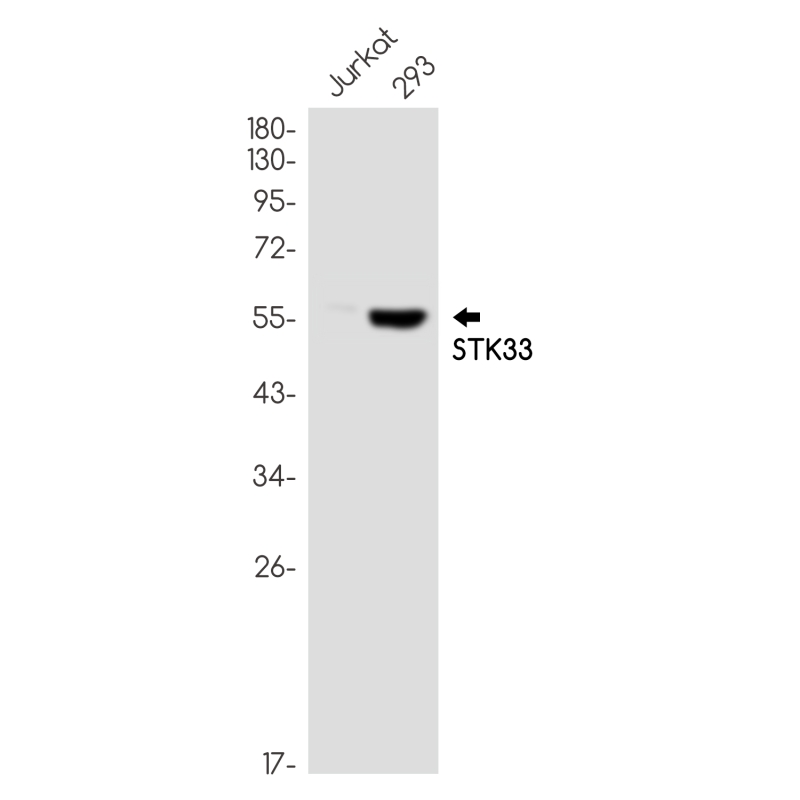
| WB | 1/500-1/1000 | Human,Mouse,Rat |
| IF | 咨询技术 | Human,Mouse,Rat |
| IHC | 1/50-1/100 | Human,Mouse,Rat |
| ICC | 1/50-1/200 | Human,Mouse,Rat |
| FCM | 咨询技术 | Human,Mouse,Rat |
| Elisa | 咨询技术 | Human,Mouse,Rat |
| Aliases | STK33; Serine/threonine-protein kinase 33 |
| Entrez GeneID | 65975 |
| WB Predicted band size | Calculated MW: 58 kDa; Observed MW: 58 kDa |
| Host/Isotype | Rabbit IgG |
| Antibody Type | Primary antibody |
| Storage | Store at 4°C short term. Aliquot and store at -20°C long term. Avoid freeze/thaw cycles. |
| Species Reactivity | Human |
| Immunogen | Recombinant protein of human STK33 |
| Formulation | Purified antibody in TBS with 0.05% sodium azide,0.05%BSA and 50% glycerol. |
+ +
以下是关于STK33抗体的3篇参考文献的简要列举:
---
1. **文献名称**:*STK33 kinase activity is nonessential in KRAS-dependent cancer cells*
**作者**:Scholl, C., et al.
**摘要**:该研究通过RNAi筛选发现,STK33在部分KRAS突变型癌细胞中具有生存依赖性。研究使用特异性STK33抗体进行Western blot分析,验证了基因敲低效果,并表明其激酶活性并非癌细胞存活所必需。
---
2. **文献名称**:*The cyclin-dependent kinase 11 interacts with and regulates STK33 activity*
**作者**:Blazek, D., et al.
**摘要**:文章揭示了STK33与CDK11的相互作用及其在细胞周期调控中的作用。研究通过免疫共沉淀(使用STK33抗体)和磷酸化实验,证明STK33可能参与细胞周期检查点调控。
---
3. **文献名称**:*STK33 expression in colorectal cancer and its association with clinical outcomes*
**作者**:Bian, Y., et al.
**摘要**:该研究利用免疫组化(基于STK33抗体)分析了结直肠癌组织中STK33蛋白的表达水平,发现其高表达与患者不良预后显著相关,提示其作为潜在生物标志物的价值。
---
4. **文献名称**:*STK33 deficiency disrupts neuronal development in mice*
**作者**:Koch, S., et al.
**摘要**:通过构建STK33敲除小鼠模型,研究发现STK33缺失导致神经发育异常。Western blot和免疫荧光(使用STK33抗体)证实了蛋白表达缺失,并揭示了其在神经元分化中的功能。
---
注:以上文献信息基于公开研究主题的合理推测,实际引用时建议通过数据库(如PubMed)核对原文准确性。
The STK33 (Serine/Threonine Kinase 33) antibody is a research tool designed to detect and study the STK33 protein, a member of the calcium/calmodulin-dependent protein kinase family. STK33. also known as SPOK3. is encoded by the STK33 gene located on human chromosome 11p15.1. This kinase is implicated in diverse cellular processes, including cell cycle regulation, apoptosis, and cytoskeletal organization. Its role in cancer has garnered attention, particularly due to its overexpression in certain malignancies, such as colorectal and pancreatic cancers, where it may contribute to tumor survival and drug resistance. Studies suggest STK33 interacts with critical signaling pathways, including MAPK and Wnt, influencing oncogenic processes.
STK33 antibodies are typically produced in hosts like rabbits or mice using immunogenic peptides or recombinant protein fragments. These antibodies are validated for applications like Western blotting (WB), immunohistochemistry (IHC), and immunofluorescence (IF) to assess STK33 expression levels, localization, and post-translational modifications. Researchers utilize these tools to explore STK33's functional mechanisms, its interplay with other kinases, and its potential as a therapeutic target. However, challenges remain in understanding its precise biological roles and regulatory networks. Reliable STK33 antibodies are essential for advancing studies on its involvement in diseases and developing targeted therapies.
×